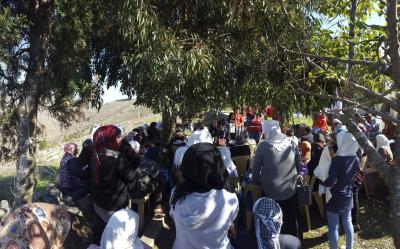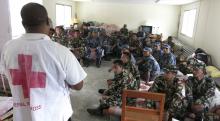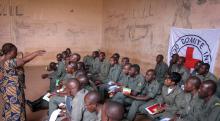Case prepared by Laura Di Gianfrancesco, Reine Pfister and Thilo Tesing, students at Roma Tre IHL Legal Clinic, under the supervision of Prof. Giulio Bartolini and Dr. Tommaso Natoli.
A. Training Combatants and Lawyers on the Rules of War in Northern Syria
In May 2016, Geneva Call’s partner organization, the AFAQ Academy, started a new series of training sessions for four Syrian armed movements active in the north of Syria. The First Coastal Division (FCD), present in the Lattakia countryside, the Failaq al-Sham brigade, active throughout Syria, and the Levant Front and the Noureddine Zenki Brigade, both operating in Aleppo, will participate in these training sessions on humanitarian norms.
In a first training session for about 15 military and civilian members of the FCD, AFAQ presented and explained Geneva Call’s 15 key rules of behaviour for fighters in an armed conflict. During that training, a religious leader from this movement addressed the issue of Islamic sources of International Humanitarian Law (IHL) and Muslims’ obligations to abide by it. In addition, the AFAQ Academy has trained 77 members of the Levant Front in Aleppo on humanitarian norms, including commanders, officers or civilians.
Since starting to work with AFAQ in 2013, Geneva Call has provided several training of trainers sessions to strengthen AFAQ’s capacity and expertise on IHL. In 2015, AFAQ’s work focused on the brigades of the Free Syrian Army and the Islam Army, and it trained more than 300 members of armed non-State actors, both combatants and civilian members.
Geneva Call also carried out a training of trainers session on humanitarian norms in partnership with the Free Syrian Lawyers Association, for 18 lawyers, members of the Free Syrian Army from Idlib and A’zaz, doctors, teachers and members of local councils. Five of the 18 lawyers were women.
[…]
B. How a Swiss NGO teaches Humanitarian Law to Syrian Rebels
Geneva Call, which has been present in Syria since 2012, promotes respect of international humanitarian norms by non-state armed actors in conflict. On September 19 it plans to relaunch its audio-visual and internet campaign on humanitarian law, Fighters not killers, coinciding with the presentation at the UN of a new Syria report by an independent international commission of inquiry.
In Syria, however, selecting the armed groups is not easy. The main criteria are that working with them could have an impact on their behaviour, followed by the accessibility of the terrain. Geneva Call works mainly with Sunni factions of the Free Syrian Army (FSA), which is a coalition of armed groups affiliated to the Syrian opposition, and the Islamic Front, which is composed of moderate Islamists and Salafists, but also with Kurdish armed groups in both the north and south of Syria. […] [I]t must be decided what types of actions will have most impact. A local partner made possible in 2015 alone the training of 300 fighters of the FSA and Islam Army in rules of war, but also civilians such as members of the Free Syrian Lawyers association.
Once on the ground, how can one convince these armed groups to respect norms that they see as far from the reality of war? The Swiss NGO thinks it has found part of the solution by concentrating on Islamic law, because “we cannot use norms that appear imposed. There are many similarities between Islamic law and the norms of humanitarian law”, says head of communication Nicolas Sion. The NGO also recognizes that even if these fighters could be indicted by an international court, that is not the most persuasive argument for these rebel groups. But they are well aware of the need to respect these norms to preserve their reputation as they conduct the war and “they think about their long-term interests”. This aspect is strengthened if a group signs a “Deed of Commitment” under Geneva Call’s auspices, which commits them publicly, even if “the aim is not always to get them to sign a Deed of Commitment, especially if the group is not structured, then it is not efficient”. In that case, Geneva Call may rather try to get them to adopt a code of conduct or modify their internal rules.
However, the rapid increase of groups on the ground with small military contingents means they are not always identifiable, and it can take several months of discussion to get a Deed of Commitment signed. “It has happened that a group dissolved itself a few months after signing,” says the head of communication. “Today is not always the same as tomorrow in the Syrian context.” Hence the utility of the audio-visual campaign Fighters not Killers, which explains the norms of humanitarian law in a simple way that can reach fighters on the ground more widely.
Once a Deed of Commitment has been signed, it has to be monitored. When Geneva Call obtained the demobilization of more than 200 Kurdish child soldiers, the NGO went to Qamishli in 2015 to see if the Deed was being respected, investigate allegations of breaches and research supplementary measures to be taken. A monitoring committee was also set up to help ensure constant dialogue with the groups. Geneva Call also gets cooperation from local NGOs and journalists who report information that is useful for monitoring adherence to commitments.
Lack of security remains an obstacle to access to the armed groups, so it is sometimes preferable to meet them outside. For example, about a dozen commanders of the Free Syrian Army received training in Geneva in December 2015 delivered by Geneva Call jurists. Nevertheless, the main thing is to ensure follow-up so as to make sure there is positive impact on the ground, which for the moment does not seem to be visible enough.
[…]
C. Geneva Call Trained Kurdish Authorities and Police Forces on International Humanitarian Norms
Following the signature of Geneva Call’s three Deeds of Commitment last June and earlier in July by the “Democratic Self-Administration in Rojava” and the People’s Protection Units (YPG), the Women’s Protection Units (YPJ), Geneva Call organized a series of training sessions on the enforcement of the obligations contained in the Deeds and more generally international humanitarian norms to both the authorities and its police forces.
The first sessions took place in June in Amuda, at the headquarters of the Self-Administration Government and gathered more than 45 officials, including the “Prime Minister” and heads and members of the legislative and executive councils. The training aimed at supporting the implementation of the Deed of Commitment banning AP mines and the Deed of Commitment prohibiting sexual violence and against gender discrimination.
Another two-day session was organized in July in Rmeylan for the Asayish – the police forces of the Self Administration – and gathered 28 officers. It was the first time Geneva Call could sensitize the Asayish on international standards governing security and law enforcement operations.
More training sessions are expected to be given to YPG/YPJ members to follow up the signature of the Deed of Commitment protecting children in armed conflict and the demobilization of 149 children under-18 from their ranks.
Discussion
I. Classification of the Situation and Applicable Law
1. How would you classify the situation in Northern Syria? What additional information would you need to make such a determination? (
GC I-IV, Art. 3)
2. Does the classification of the situation matter for determining whether IHL was respected in this case?
3. Can a “Deed of Commitments” be qualified as a “special agreement” under
GC I-IV, Art. 3?
II. Training and Dissemination
5. Do you identify any difference in legal obligations pertaining to IHL dissemination towards armed forces, members of organized armed groups and civilian population? Is a basic training on the core humanitarian rules sufficient to ensure respect for IHL?
6. In your opinion, did the fact that relevant organized armed groups signed a series of “Deeds of Commitment” have a positive impact of IHL dissemination activities? Why do you think training programs are helpful to support the implementation of Deeds of Commitment?
7. What is the role of organisations like Geneva Call in IHL dissemination among the parties to an armed conflict?
III. Elements contributing to respect for IHL
8. Did the signature of the “Deeds of Commitment” have additional follow-up regarding IHL obligations apart from the management of training courses? Were organized armed groups keen to implement relevant provisions provided in such documents? Did local civil society play any role in monitoring and supporting the application of “Deeds of Commitment”? Do you agree that the existence of such follow-up mechanisms enhance respect of IHL by the parties to the conflict? Why? How?
9. Do you think it is relevant to teach IHL through references to religious values and to involve religious leaders in the training sessions as in this case? Can religion play a role in compliance with humanitarian norms?
10. Is “the need to respect these norms to preserve their reputation” a pushing factor for the application of IHL by organized armed groups? Do you think that internal and external pressure on the parties to the conflict can contribute to the respect of IHL?
11. Why it is that “even if these fighters could be indicted by an international court, that is not the most persuasive argument for these rebel groups”? In your opinion, does the deterrent effect of criminalisation of violations of IHL have a positive impact in ensuring the respect for the law?
12. Do you think that the involvement of senior civilian leaders linked with organized armed groups in training courses can increase the success of these efforts?




